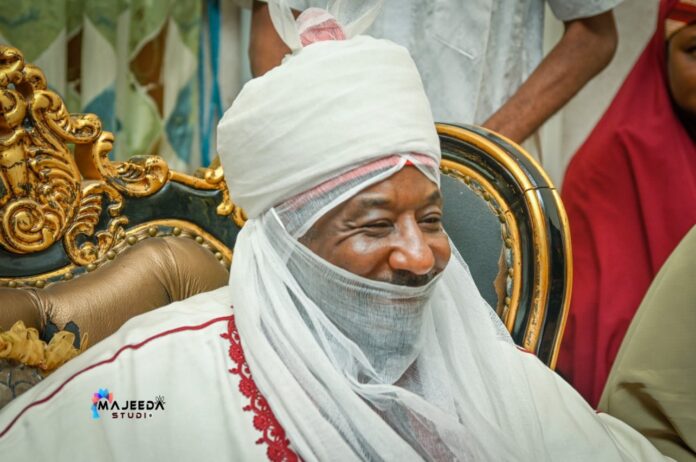In a new twist to the ongoing political conversation, the 16th Emir of Kano, Muhammad Sanusi II, has accused the Federal Government of sensationalising his remarks about President Bola Tinubu’s economic policies. Sanusi, renowned for his outspoken views on national issues, lashed out at what he termed as a misrepresentation of his speech during a recent memorial lecture held in honour of late human rights activist, Chief Gani Fawehinmi.
The controversy ignited last week when Sanusi spoke candidly about the challenges faced by President Tinubu’s administration. His remarks focused on the country’s economic difficulties, with the monarch revealing that he would no longer be offering his advice to the government on economic matters.
Sanusi, in his speech, pointedly stated, “I have chosen not to speak on the economy or reforms, or to explain anything because if I explain it, it will help this government. But I don’t want to help this government. They are my friends, but if they don’t behave like friends, I won’t behave like a friend.” This comment quickly stirred political reactions, particularly from the Federal Government.
In a robust response, the Ministry of Information and National Orientation, led by Mohammed Idris, condemned Sanusi’s statement, dismissing the need for the former Central Bank of Nigeria (CBN) governor’s endorsement of Tinubu’s economic policies. The government said the comments were “deeply disappointing” and should not be regarded as reflective of any genuine critique.
However, Sanusi, undeterred by the government’s reaction, took to social media to clarify his stance. In a series of posts on X (formerly Twitter), he vehemently denied the accusations of undermining the administration and expressed his frustration over the way his words had been “sensationalised.”
“They took one paragraph out of context and sensationalised it; nothing about the nuanced support given to the government,” he wrote. He elaborated that his initial comments had been more measured and balanced, encompassing both criticism and support for Tinubu’s ongoing reforms.
Sanusi went further to explain that his remarks were not meant to undermine the government but to highlight the challenges the country faced due to long-standing economic mismanagement. “There are arguments supporting the reforms. That we are paying a price for decades of mismanagement before Tinubu. That there is light at the end of the tunnel. That we should all pray and support the system and talk about the good things happening,” Sanusi said.
For many Nigerians, Sanusi’s comments reflect a nuanced understanding of the nation’s economy, acknowledging the painful but necessary steps needed to recover from years of fiscal mismanagement. It is a view that, though critical of the past, is cautiously optimistic about the potential outcomes of Tinubu’s reforms.
This is not the first time Sanusi has spoken critically about the Nigerian government. As a former Governor of the Central Bank of Nigeria, Sanusi has a history of outspoken views on the country’s economic policies. His tenure at the CBN was marked by significant reforms, including efforts to curb corruption in the banking sector and to promote transparency. However, his tenure was also controversial, particularly in relation to his outspoken criticisms of both the government and the private sector.
Sanusi’s relationship with the present administration has been somewhat strained. Although he has expressed his willingness to support good governance, his calls for accountability and structural reforms have often placed him at odds with political figures. His recent comments about not wanting to offer advice unless the government behaves “like friends” point to a deepening frustration with the way things are currently unfolding.
The economic challenges mentioned by Sanusi, including inflation, unemployment, and debt management, are issues that have dominated public discourse since Tinubu assumed office. The president has introduced several reforms aimed at stabilising the economy, including subsidy removals and currency devaluation. While these policies have been praised by some for their long-term potential, they have also sparked widespread protests due to the immediate hardships they impose on the average Nigerian citizen.
Sanusi’s statements, therefore, come at a time when many are questioning the balance between necessary economic reforms and the social costs associated with them. His call for prayer and support for the system may be seen as a plea for national unity and perseverance amid the tough economic climate.
The Federal Government’s response to Sanusi’s comments has, unsurprisingly, sparked a wide range of reactions. On one hand, some supporters of the Tinubu administration have argued that the Emir’s remarks were premature and unnecessarily critical. They contend that the president’s reforms are necessary for the country’s long-term development, even if they come at a cost in the short term.
On the other hand, critics of the government view Sanusi’s words as an honest reflection of the struggles faced by Nigerians, even if it means criticizing the administration. Many agree with Sanusi’s assertion that decades of economic mismanagement have led to the current crisis and that the country must endure temporary hardship for the sake of a better future.
The ongoing dispute between Sanusi and the Federal Government highlights a critical issue in Nigeria’s political and economic discourse: the challenge of balancing reform with compassion for the people. As President Tinubu continues to push through his economic agenda, the country remains divided over the best course of action.
Sanusi’s insistence that he is neither against the government nor the president’s reforms, but simply reluctant to offer advice unless the government changes its approach, signals a deeper issue of trust and collaboration. For many, the question remains: can Sanusi and the Tinubu administration find common ground? Or will this latest exchange be yet another sign of the widening gulf between policymakers and public intellectuals in Nigeria?

